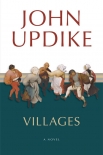Villages by John Updike (best summer reads of all time .TXT) 📗

- Author: John Updike
Book online «Villages by John Updike (best summer reads of all time .TXT) 📗». Author John Updike
The dream of Barbara Emerich brought back to him the aura, the climate of a woman, the cloud her presence makes as you walk along a street beside her, haunch to haunch, her long hair and skirt symbolizing the primordial difference, a difference concealed by clothes and fig leaves yet advertised by a wealth of external signs, such as her finer skin texture and lighter, quicker voice. At MIT, in their student years, unmarried, he and Phyllis, simultaneously weary of studying, might of an evening decide to go to a movie, in Central Square or on Boston’s Washington Street by way of the “T,” and there was sex in this, the impromptu joint flight into escapism, an attempt to extend the rapport their genitals timidly sought into the village domain of open entertainment and street life: he loved her then, the atmosphere of her flowing beside him down the sidewalk, hurrying lest they be late, and her consensual silence as she dipped her hand into the shared bucket of popcorn—though much less was made of popcorn in those days, concession profits were not so crucial to cinema houses—and let her attentive face be licked by the electric flashes, like so many short circuits, of The Caine Mutiny or Seven Brides for Seven Brothers or Rear Window or La Strada or Mr. Hulot’s Holiday.
A piece of village wisdom he was slow to grasp is that sex is a holiday, an activity remarkably brief in our body’s budget compared with sleeping or food-gathering or constructing battlements for self-defense, such as the Great Wall of China. The unfaithful man and woman meet for a plain purpose, dangerous and scandalous, with the blood pressure up and the pupils enlarged and the love-flush already reddening the skin: is there not a praiseworthy economy in this, as opposed to sex spread thin through the interminable mutual exposure of a marriage?
Phyllis’s finding that patch of slick leaves on Old County Road to take flight on, landing upside down there by the buzzing, frothy edge of the woods—this had seemed directed at him, with one of her characteristic sly backward glances, though he knew with the rational fraction of his brain that accidents are accidents and demonstrate only the vacant absurdity of everything that is. Yet we seek to impose patterns of meaning around ourselves, interlocking networks vectored back to the ego, le point de départ if not the Archimedean point that lifts this heavy, tangled, cluttered world into a schematic form we can manipulate.
Middle Falls, in the years when he lived there, was mapped by the location of the homes of women in whom Owen was interested. In that house lived one he had slept with; in another, a woman he fantasized about sleeping with; and in the houses in between them were blank, uninhabited, empty spaces such as used to mark the interior of Africa, and Arabia Deserta, and the South Seas. Driving or walking in Middle Falls, then, gave Owen the happiness of orientation, of his position being plotted on a specific cartography, of being somewhere. There are fewer and fewer somewheres in America, and more and more anywheres, strung out along numbered highways. Even those who live along the highway do not always know its number. Though Owen has lived, driving and walking, in Haskells Crossing longer than at any other address, it remains unmapped in his mind, or mapped as vaguely as the Americas were in the sixteenth century, a set of named harbors and approximate coastlines enclosing wild hopes of El Dorado as well as many infidel savages to be exterminated.
There is an enlarging hollow in his life—its approaching end, perhaps. Julia cannot save him, though the sight of her, clothed and unclothed, still lifts his heart. She cannot save him with her silky willing body, her uncanny aquamarine gaze, or her matter-of-fact Christian piety, in which he has joined her in defiance of his scientific instincts and his indifferently churched upbringing. Grampy read the Bible on the caneback sofa; Grammy believed in devils and hexes. His father served the lords of local capitalism with conventional attendance, Christmas and Easter and most other Sundays. It was Owen’s mother who was the real cosmic questioner, the uncomforted Job, her face at times smeared with tears while she gave voice to her unhappiness, whose source the boy could never quite see. We do not see our parents well; they are too big, and too close.
In Haskells Crossing and the near section of Cabot City there are public tennis courts, used by those who do not have their own or access to a country club’s. The sight of them quickens in Owen a memory that surfaced after long suppression: when he was a boy of nine or ten his auburn-haired mother would put shorts on her pale, growingly plump legs and walk with him and two wood-framed rackets down through the Mifflin Avenue back yard and across the wide high-school grounds past the cinder track and little bleachers for the cinder-circumscribed football field, and open the latch of the four Willow public courts, fenced in by heavy galvanized wire. He and she would attempt to play. Neither had ever had lessons; it was frustrating, so many balls bopped into the net (also of heavy playground fencing, which





Comments (0)